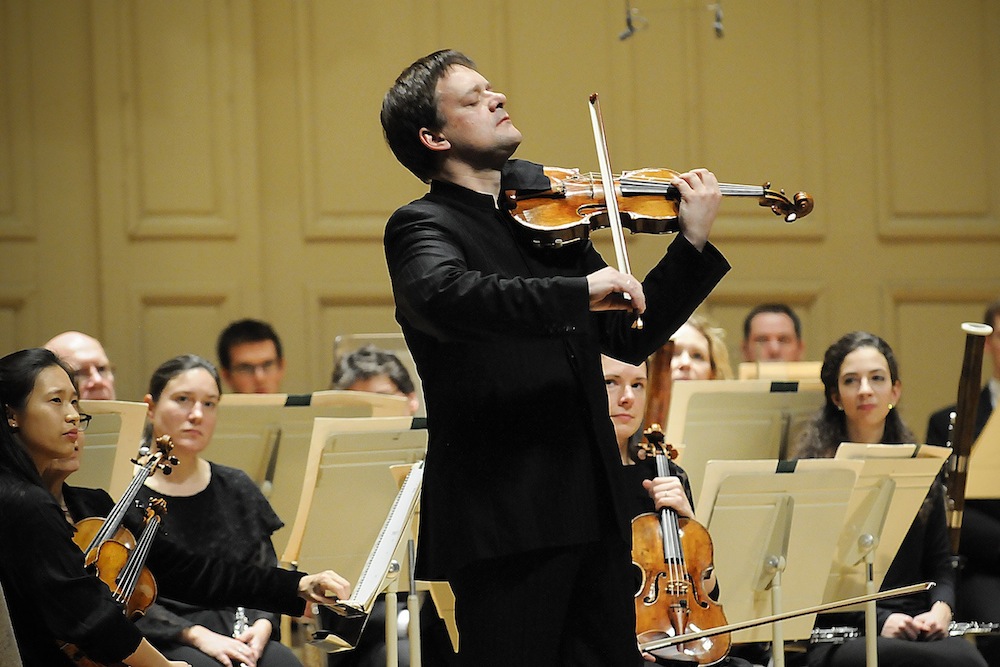Zimmermann brings apt Nordic cool to Sibelius with BSO

Frank Peter Zimmermann performed the Sibelius Violin Concerto with conductor Juanjo Mena and the Boston Symphony Orchestra Thursday night. Photo: Stu Rosner
There was a time when it seemed that the Boston Symphony Orchestra played nothing but Sibelius. His symphonies and other orchestral works were featured frequently in nearly every BSO season between 1907 and 1950, helping to cement the composer’s reputation as Finland’s national hero among American audiences.
Although not played quite as often today, Sibelius’ music remains a familiar part of the orchestra’s programming. The next two weeks of concerts alone offer two of his most beloved pieces, the pastoral Second Symphony and the brilliant and moody Violin Concerto, heard at Symphony Hall Thursday night.
There may be no more beautiful and mesmerizing music in the repertoire than the opening movement of Sibelius’ Violin Concerto. The violinist is called upon to maneuver a fiery display of triple stops and winding figures that encompass the full range of the instrument without losing the music’s haunting Nordic lyricism. Especially stirring is the culminating theme, played in spacious sixths and octaves in the violin’s silvery upper register. It was in those moments that the evening’s soloist, German violinist Frank Peter Zimmermann, was at his best.
Zimmermann has a reputation for crystalline technique and substantive interpretations of some of the most difficult pieces in the repertoire, the Sibelius concerto among them. His playing of the work Thursday night was remarkable for its technical aplomb and a distant, but palpable, tonal warmth.
This was evident from the beginning. He played the opening phrase of the concerto with an airy, almost hollow tone that sounded like a voice in a cold wilderness. The violinist gave each of the recurring thematic statements different shades of color, sometimes with a darker tone, at others a crisp, penetrating one. His handling of the cadenza that comes at the middle of the movement was spectacular as he crafted each phrase with finesse, the dazzling figures sounding with a distant glow.
The second movement was gorgeous. There, Zimmermann mined the yearning lyricism from the aria-like melody with a rich mahogany tone. With gentle waving gestures, the evening’s conductor, Juanjo Mena, spun a soft web of orchestral accompaniment in support.
In the final movement, Zimmermann played the darting lines of the primary theme with dexterity. But his approach, at times, was too delicate, and one wanted a little more bite to match the rolling thunder of the orchestral accompaniment. In other passages, however, Zimmermann’s lighter touch paid dividends, his elegant rendering of the theme an apt match for the nimble woodwind figures later in the movement. The violinist dug in for a vigorous conclusion, his playing taking on a sharper edge well suited to the music’s wild, rustic strains.
Rapturous applause brought Zimmermann back to the stage for a single encore, a silvery rendition of the Prelude from Bach’s Partita No. 3.
After intermission, Mena led a sparkling performance of Schubert’s Great Symphony in C major.
The Spanish conductor leads with gentle gliding gestures and sudden flicks of the arms. It is an animated style that, combined with his clear-eyed interpretation of the music, brought out the ebullience laden within Schubert’s heroic score.
The first movement’s slow introduction sounded with svelte phrases from the woodwinds, the opening horn call setting a stately tone. The ensuing Allegro burbled with energy and the delicate lines skipped with a light Mozartean bounce. The musicians gave the second movement a graceful lilt that bubbled under the surface even in the music’s more hymn-like second theme. Mena took care to tease out the trumpet and horn calls as well as the gently waving violin figures that sounded from behind the nimble principal melody.
The agitated opening of the Scherzo sometimes lacked definition from the strings, though that did not get in the way of the movement’s sweeping lines, which moved as if a waltz. Mena led the orchestra in a bustling finale, the music remaining crisp and buoyant even in the softest of passages.
The concert was dedicated to the memory of Thomas Menino, the longtime mayor of Boston who died Thursday.
The program will be repeated 1:30 p.m. Friday and 8 p.m. Saturday and Tuesday at Symphony Hall. bso.org; 617-266-1492.
Posted in Performances



